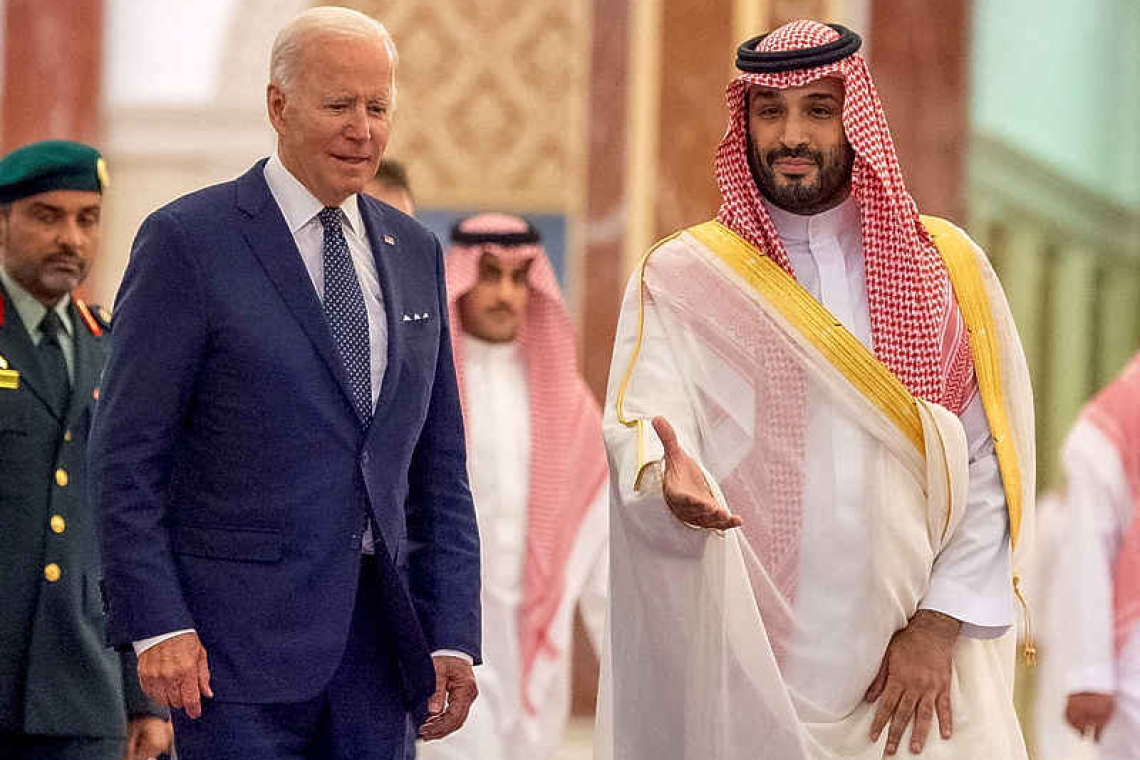RIYADH--Saudi Arabia is determined to secure a military pact requiring the United States to defend the kingdom in return for opening ties with Israel and will not hold up a deal even if Israel does not offer major concessions to Palestinians in their bid for statehood, three regional sources familiar with the talks said. A pact might fall short of the cast-iron, NATO-style defence guarantees the kingdom initially sought when the issue was first discussed between Crown Prince Mohammed bin Salman and Joe Biden during the U.S. president's visit to Saudi Arabia in July 2022. Instead, a U.S. source said it could look like treaties Washington has with Asian states or, if that would not win U.S. Congress approval, it could be similar to a U.S. agreement with Bahrain, where the U.S. Navy Fifth Fleet is based. Such an agreement would not need congressional backing. Washington could also sweeten any deal by designating Saudi Arabia a Major Non-NATO Ally, a status already given to Israel, the U.S. source said. But all the sources said Saudi Arabia would not settle for less than binding assurances of U.S. protection if it faced attack, such as the Sept. 14, 2019 missile strikes on its oil sites that rattled world markets. Riyadh and Washington blamed Iran, the kingdom's regional rival, although Tehran denied having a role. Agreements giving the world's biggest oil exporter U.S. protection in return for normalisation with Israel would reshape the Middle East by bringing together two longtime foes and binding Riyadh to Washington after China's inroads in the region. For Biden, it would be a diplomatic victory to vaunt before the 2024 U.S. election. The Palestinians could get some Israeli restrictions eased but such moves would fall short of their aspirations for a state. As with other Arab-Israeli deals forged over the decades, the Palestinian core demand for statehood would take a back seat, the three regional sources familiar with the talks said. "The normalisation will be between Israel and Saudi Arabia. If the Palestinians oppose it the kingdom will continue in its path," said one of the regional sources. "Saudi Arabia supports a peace plan for the Palestinians, but this time it wanted something for Saudi Arabia, not just for the Palestinians." The Saudi government did not respond to emailed questions about this article. A U.S. official, who like others declined to be named because of the sensitivity of the matter, said the parameters of a defence pact were still being worked out, adding that what was being discussed "would not be a treaty alliance or anything like that ... It would be a mutual defence understanding, less than a full treaty." The official said it would be more like the U.S. relationship with Israel, which receives the most advanced U.S. weapons and holds joint air force and missile defence drills. A source in Washington familiar with the discussions said MbS had asked for a NATO-style treaty but said Washington was reluctant to go as far as NATO's Article 5 commitment that an attack on one ally is considered an attack on all. The source said Biden's aides could consider a pact patterned on those with Japan and other Asian allies, under which the U.S. pledges military support but is less explicit about whether U.S. troops would be deployed. However, the source said some U.S. lawmakers might resist such a pact. Another template, which would not need congressional approval, would be the agreement signed with Bahrain on Sept. 13, in which the U.S. pledged to "deter and confront any external aggression" but also said the two governments would consult to determine what, if any, action would be taken. The source in Washington said Saudi Arabia could be designated a Major Non-NATO Ally, a step which had long been considered. This status, which several Arab states such as Egypt have, comes with a range of benefits, such as training. The second of the regional sources said Riyadh was compromising in some demands to help secure a deal, including over its plans for civilian nuclear technology. The source said Saudi Arabia was ready to sign Section 123 of the U.S. Atomic Energy Act, establishing a framework for U.S. peaceful nuclear cooperation, a move Riyadh previously refused to take. The Gulf source said the kingdom was prepared to accept a pact that did not match a NATO Article 5 guarantee but said the U.S. had to commit to protecting Saudi Arabia if its territory was attacked. The source also said a deal could be similar to Bahrain's agreement but with extra commitments.







